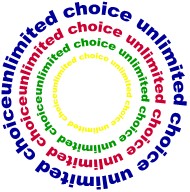A new beginning
 While I've been remiss about posting here of late, that is not an indication that I haven't been thinking. When I started this blog, I wrote about the fact that I've read many of the leading business/thought books of the past couple of years, and feel as if there is some unifying theme that ties them all together. I tried out ideas like "on-demand culture" and spent a lot of time writing about The World is Flat and The Long Tail, but seemed no closer to tying it all together.
While I've been remiss about posting here of late, that is not an indication that I haven't been thinking. When I started this blog, I wrote about the fact that I've read many of the leading business/thought books of the past couple of years, and feel as if there is some unifying theme that ties them all together. I tried out ideas like "on-demand culture" and spent a lot of time writing about The World is Flat and The Long Tail, but seemed no closer to tying it all together.I've been inspired lately by Traci Fenton, who runs the organization WorldBlu. Fenton's group pushes the idea of "organizational democracy," a concept she says is somewhat drawn from a synthesis of ideas from herself and others. She cites the work of Jim Collins, Thomas Friedman, Peter Senge and Margaret Wheatley, among others, saying they “have been coming at it from different pieces of the pie. What organizational democracy does is it brings it all together, and says it’s about creating an entire system,” she said.
I have similar thoughts about the Long Tail and related notions of choice and search. I'm a believer in Chris Anderson's notion that the Long Tail will revolutionize the world, as the availablity of more and more products liberates consumers. At the same time, I understand Barry Schwartz, who might be seen as the anti-Anderson, who preaches that too much choice actually can make us very unhappy. Somewhere in all of this is John Battelle, whose work in the field of search seems to be a bridging link, or at least a way to capitalize on Anderson's ideas while ameliorating the effect's of Schwartz's.
The result? An emerging sythesis of my own: Unlimited choice is the ideal, as long as people also are allowed to choose the level of choice from which to choose. As you can tell, that doesn't quite have the punch of a suitable book subtitle, so perhaps some amplification is in order. Essentially, the Long Tail can and should enable people to have as much choice as they like. Take books, for example (as Anderson does in his book). Those who want unlimited choice can shop at Amazon.com or whatever comes next, browsing digitally through hundreds of thousands of books. Those who want a more directed search with fewer options, could visit a Barnes & Noble or other superstore, with 150,000 some odd titles within reach. Those who are content to read popular works and who don't necessarily want to browse or explore will likely be happy with the 20-40,000 titles in a mall B. Dalton or Waldenbooks.
Thus, choice works best when consumers are allowed to choose the level of choice from which to choose. Can I integrate the work of Richard Florida, Malcolm Gladwell, Tom Friedman, Stephen Johnson and others into this? Perhaps. At least now, after more than a year of nibbling at the edges of this idea, I feel as if I'm starting to see it as a whole.
